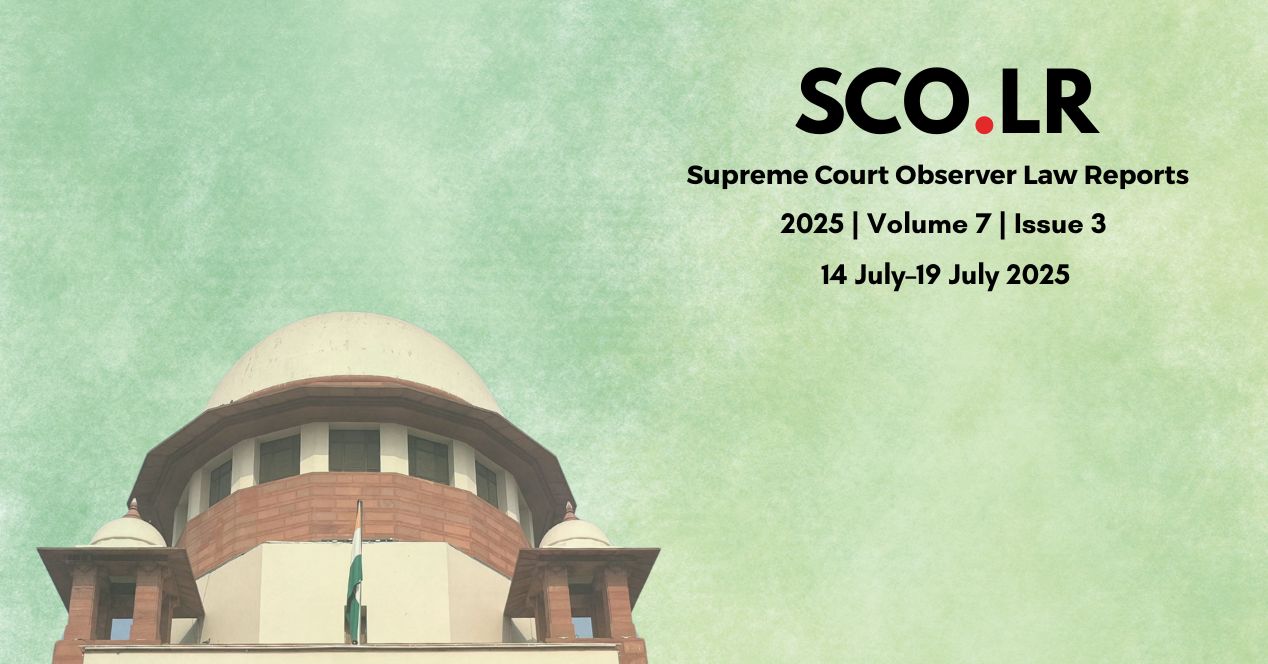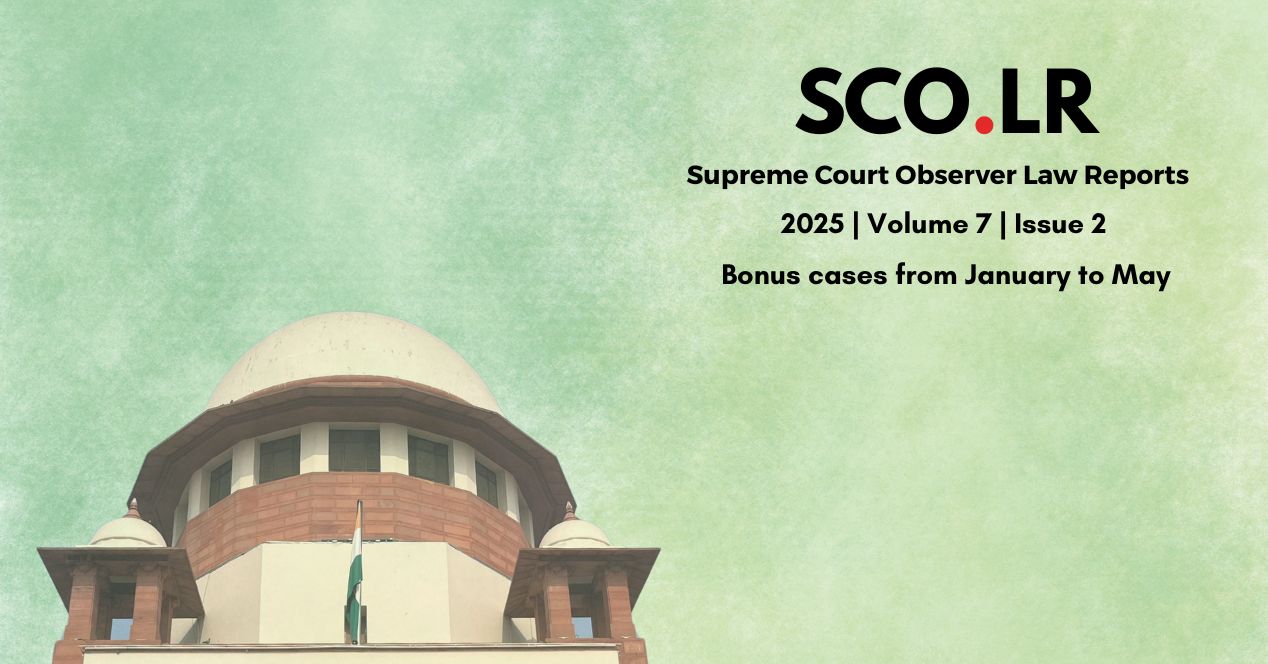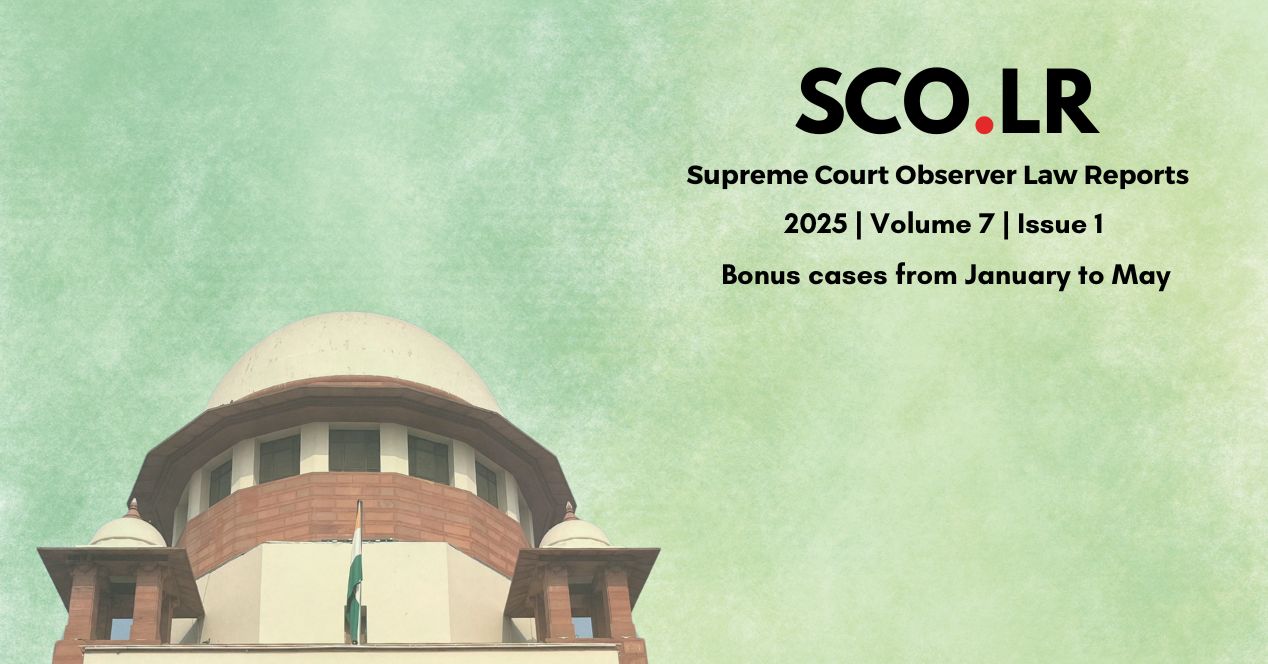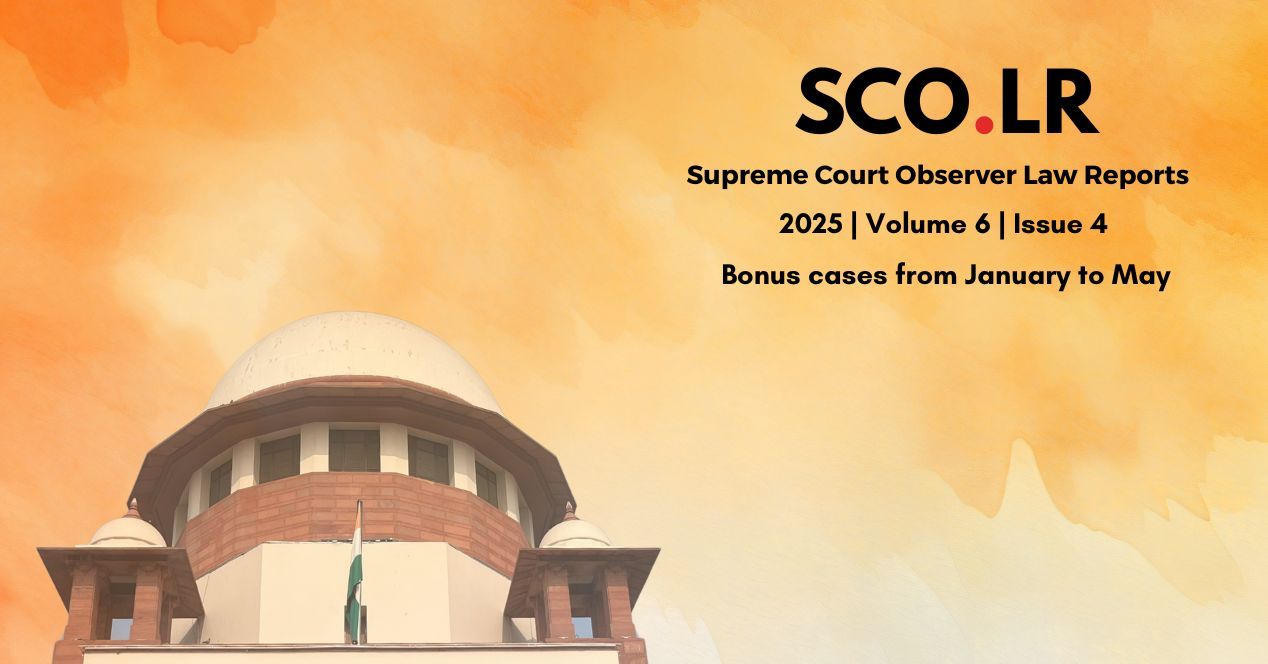Analysis
SCO.LR | 2025 | Volume 7 | Issue 4
In this Issue of SCO.LR, we summarise five significant and unmissable judgements from 21 July to 26 July 2025
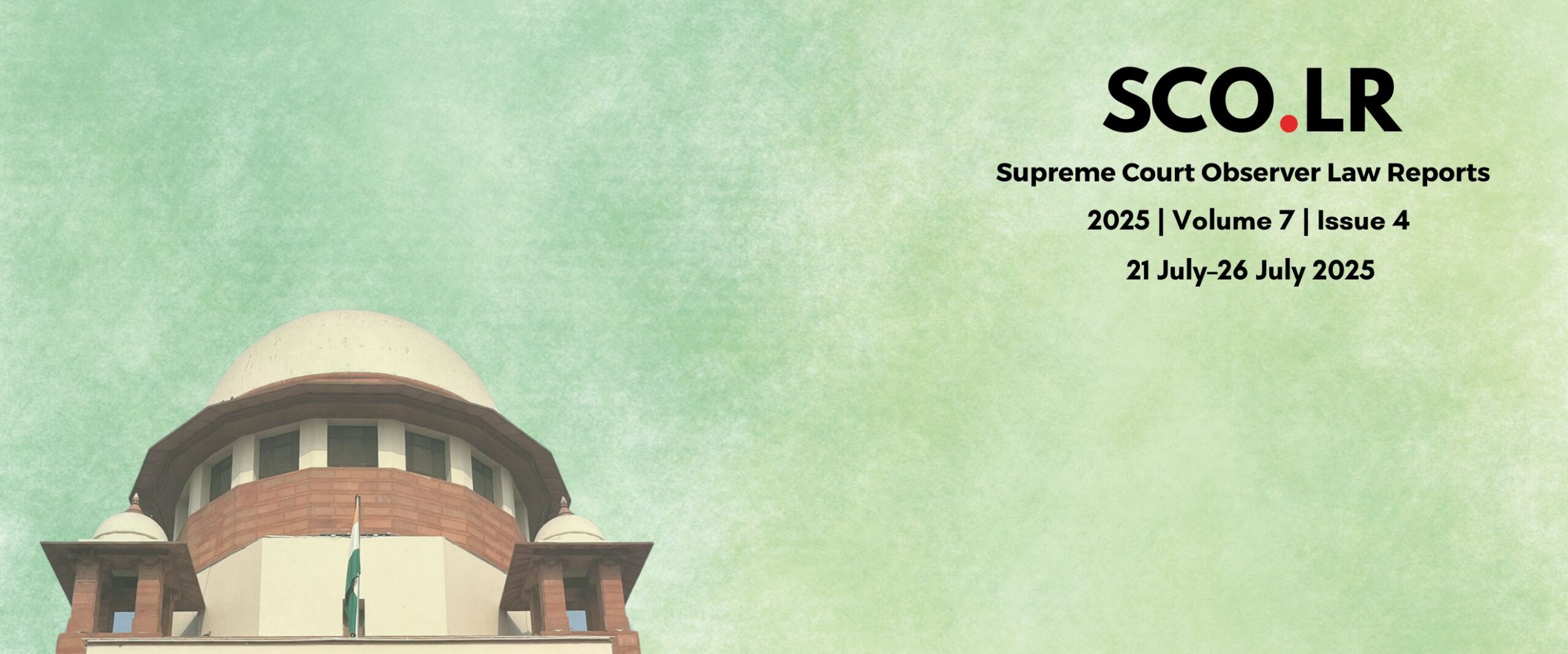
The Supreme Court is back in the swing of things after its return from the summer break. The headlines last week were dominated by the Presidential Reference and Justice Varma’s petition against the in-house committee’s report. But it was also a week when the Court delivered 22 new judgements.
We cover five key ones in this final July Issue of the Supreme Court Observer Law Reports (SCO.LR). The verdicts cover topics as diverse as perverse bail orders, the doctrine of merger, the presumption of validity of a Will, admissibility of a second FIR quashing application and mental health in educational institutions. You can read these judgements in HTML format on the SCO.LR page.
Have you been using SCO.LR in your legal practice or as part of academic work? We’d love to hear from you at admin@scobserver.in.
**********
The Supreme Court Observer Law Reports
SCO.LR | Volume 7 | Issue 4
21 July–26 July 2025
**********
Cancellation of Bail When Facts Shock Court’s Conscience
21 July 2025
Citations: 2025 INSC 877 | 2025 SCO.LR 7(4)[16]
Bench: Justices Vikram Nath and Sandeep Mehta
The Supreme Court held that while bail granted may not be cancelled ordinarily, courts are not powerless to cancel bail where the facts shock the conscience and where cancellation is needed to ensure a fair trial.
A woman superintendent in a protection home was accused of administering intoxicating medicines and injections to women inmates to expose them to influential men for sexual favours. The High Court granted her bail after she challenged a Trial Court order denying it.
The Supreme Court found that the High Court had overlooked Section 15A(3) of the SC/ST (Prevention of Atrocities) Act, 1989, which mandates a hearing of the victim before granting bail. The Court agreed with the contention that the accused was in a position to influence witnesses. Calling it an exceptional case, the Court found that the High Court’s order was cryptic and unreasoned. It exercised its extraordinary jurisdiction under Article 136 to direct the cancellation of bail.
Keywords/phrases: SC/ST (Prevention of Atrocities) Act—Section 15A(3)—cancellation of bail—perverse bail order—shocking the conscience—extraordinary jurisdiction
Read the judgement here.
Mind map**********
Registered Will Presumed Genuine
Metapalli Lasum Bai v Metapalli Muthaih
21 July 2025
Citations: 2025 INSC 879 | 2025 SCO.LR 7(4)[17]
Bench: Justices Vikram Nath and Sandeep Mehta
The Supreme Court reaffirmed that a Will, if registered, carries a presumption of genuineness. The burden to prove otherwise lies on the party challenging the Will, who must demonstrate that it was not executed properly or that suspicious circumstances cast doubt on its validity
After Metpalli Rajanna died in 1983, a dispute arose between Lasum Bai, his second wife, and Metapalli Muthaih, his son from his first marriage. Lasum Bai claimed ownership of land based on a registered Will and an oral family arrangement made by Rajanna, while Muthaih contended the land was ancestral property and that Rajanna had died intestate. The Trial Court upheld the Will and Lasum Bai’s claim, but the Andhra Pradesh High Court partly reversed this, granting Muthaiah a 3/4th share and Lasum Bai only 1/4th.
The Supreme Court restored the Trial Court’s ruling, observing that Muthaiah had admitted his father’s signature on the Will and acknowledged Lasum Bai’s possession of the land. The Court further reaffirmed the persuasive nature of oral family settlements when supported by consistent evidence and the fact of possession.
Keywords/phrases: Registered Will—presumption of genuineness—burden of proof—oral family settlement—succession—joint family property—possession as corroboration
Read the Judgement here.
Mind map**********
Orders Obtained by Fraud Not Protected by Doctrine of Merger
Vishnu Vardhan v State of Uttar Pradesh
23 July 2025
Citations: 2025 INSC 884 | 2025 SCO.LR 7(4)[18]
Bench: Justices Surya Kant, Dipankar Datta and Ujjal Bhuyan
The Supreme Court held that the doctrine of merger—which states that a lower court’s judgement is subsumed by the higher court’s verdict—will not apply where the order obtained in the lower court was a result of fraud and suppression of material facts.
The dispute arose over compensation for land acquired by the New Okhla Industrial Development Authority. The respondent, being one among three owners, asserted sole ownership and obtained a substantial compensation award from the Allahabad High Court. He failed to disclose prior proceedings that acknowledged joint ownership. The appellant approached the Supreme Court under Article 32 to challenge the order. Earlier, in related proceedings, the Supreme Court had partly allowed a civil appeal filed by the respondent and set aside the deduction of development charges ordered by the High Court.
The Supreme Court found that the respondent’s failure to disclose material facts and the trajectory of inconsistent claims amounted to fraud, rendering the impugned order a nullity. It rejected the challenge to maintainability on the ground of intra-court appeal, holding that fraud is an exception to the doctrine of merger and procedural limitations.
Keywords/phrases: Article 32—Allahabad High Court—declared sole ownership—set aside—fraud vitiates proceedings—fraud is an exception to the doctrine of merger
Read the Judgement here.
Mind map**********
Second Quashing Petition on Pre-Existing Grounds Impermissible
M.C. Ravikumar v D.S. Velmurugan
23 July 2025
Citations: 2025 INSC 888 | 2025 SCO.LR 7(4)[19]
Bench: Justices Vikram Nath and Sandeep Mehta
The Supreme Court held that a second quashing petition under Section 482 of the Code of Criminal Procedure (CrPC) is generally not maintainable if it relies on grounds already available at the time of the first petition.
The case arose out of a loan dispute between the complainant, MC Ravikumar and the accused-respondent, D.S. Velmurugan. Ravikumar alleged that Velmurugan failed to return the original property documents after he had repaid the loan. When one of the accused, P. Jothikumar, later produced these documents in a civil suit, Ravikumar filed a criminal complaint. The first quashing petition filed by the accused was dismissed by the High Court. A second petition was later allowed.
The Supreme Court held that the second petition raised no new or unavailable grounds and amounted to a disguised review of the earlier order by a co-ordinate bench. It rejected the respondent’s arguments of a change in circumstances resulting from the quashing of a similar complaint. It noted that this event took place before the filing of the first quashing petition and the ground had been available for the respondent to take at the time.
Keywords/phrases: Section 482—Code of Criminal Procedure—second quashing petition—inherent powers—review barred—same grounds—successive petitions—abuse of process
Read the Judgement here.
Mind map**********
Mental Health Integral Component of Right to Life
Sukdeb Saha v State of Andhra Pradesh
25 July 2025
Citations: 2025 INSC 893 | 2025 SCO.LR 7(4)[20]
Bench: Justices Vikram Nath and Sandeep Mehta
The Supreme Court recognised the right to mental health as an integral component of the right to life under Article 21. It laid down binding guidelines for educational institutions and coaching centres across India.
A 17-year-old student was undergoing coaching for the National Eligibility-cum Entrance Test (NEET) examination. She died under suspicious circumstances while residing in a hostel. Dissatisfied with the conduct of the police and the forensic classification of the death as suicide, the parent moved the Andhra Pradesh High Court through multiple writ petitions, seeking transfer of the investigation to the Central Bureau of Investigation (CBI). The High Court rejected these petitions.
The Supreme Court set aside the orders of the High Court after identifying lapses in the investigation. It allowed the transfer to CBI. Exercising its powers under Article 32, the Supreme Court laid down mental health guidelines for all educational institutions, coaching centres and student-centric environments. It also directed states and Union Territories to notify the rules within two months and also form district-level monitoring committees.
Keywords/phrases: Article 21—Right to Mental Health—Andhra Pradesh High Court—rejected plea for transfer to CBI—set aside—impartial investigation— mental health guidelines
Read the judgement here.
Mind map

